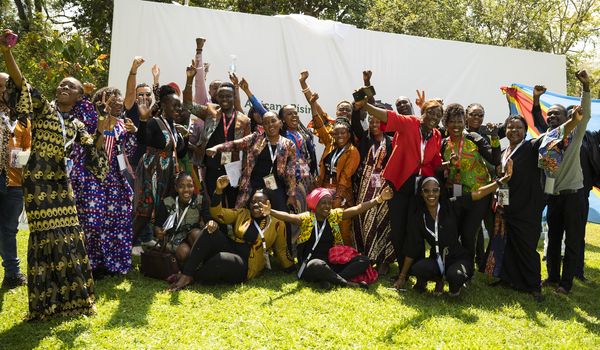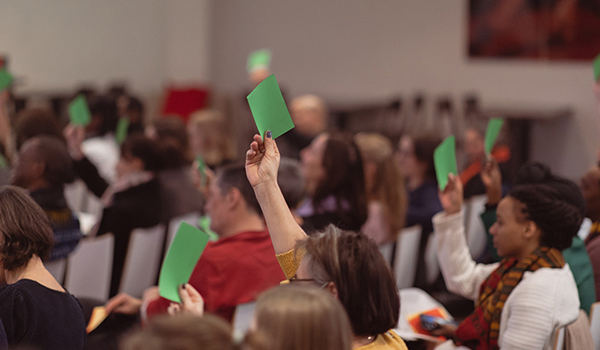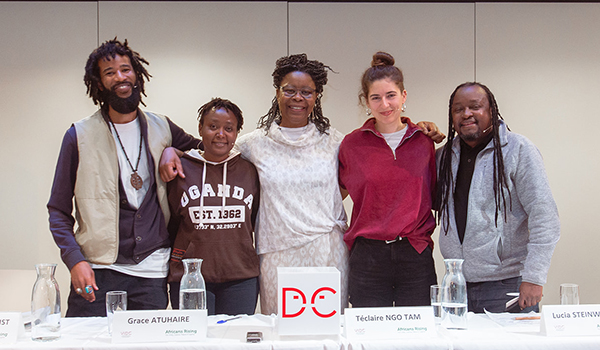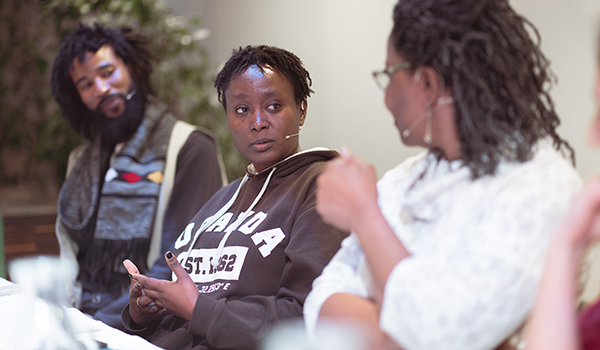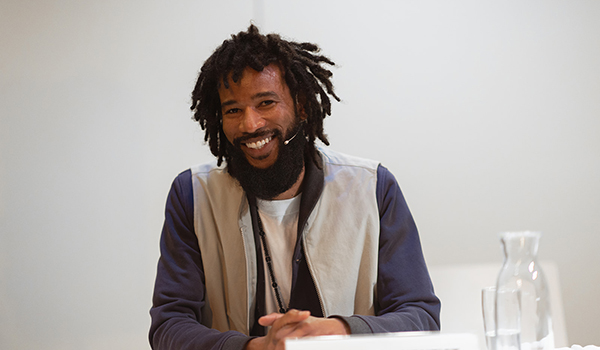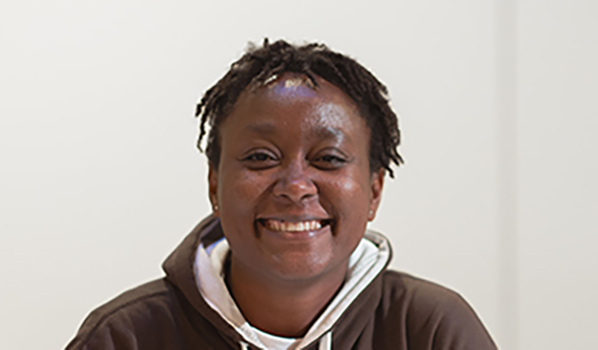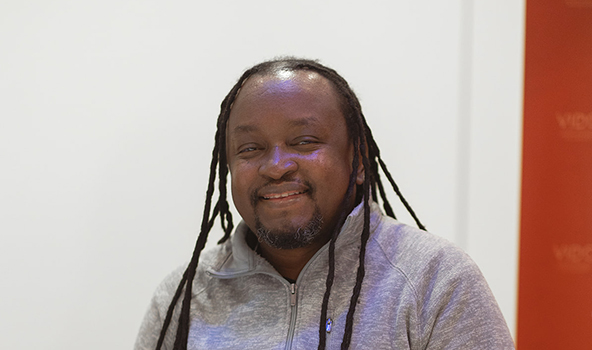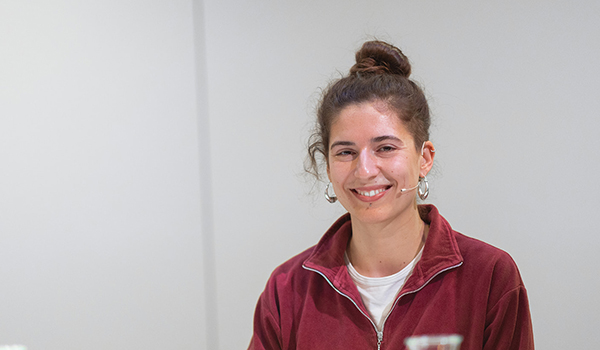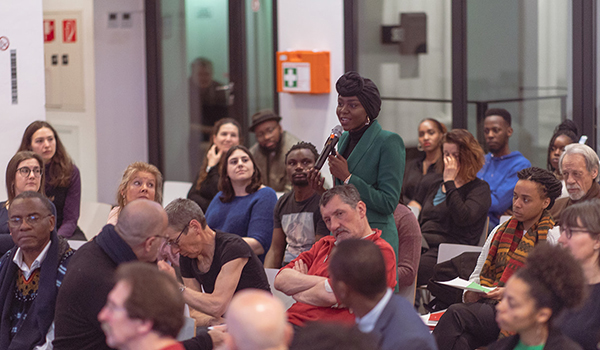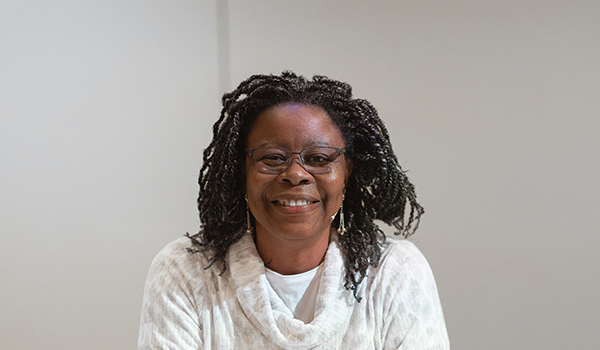In Zeiten weltweit zunehmender Ungleichheit und einer Klimakatastrophe, die selbst der globale Norden nicht mehr leugnen kann, nimmt auch der Aktivismus zu. In und von Afrika aus, einem Kontinent, der am wenigsten zur Klimakrise beiträgt aber am stärksten davon betroffen ist, haben Protestgruppen eine panafrikanische Allianz namens Africans Rising aufgebaut. Am 14. März nahmen die ugandische Aktivistin Grace Atuhaire und der kenianische „Community Organizer“ Mutemi wa Kiama, beide Mitglieder von Africans Rising, an der VIDC- Podiumsdiskussion teil. Zusammen mit der österreichischen Aktivistin Lucia Steinwender von „System Change, not Climate Change“, dem afro-karibischen Expat-Künstler Jahson the Scientist sowie dem Ghanaer Hardi Yakubu, der per Video zugeschaltet wurde, sprachen sie über ihre Werte und Hoffnungen, die sie zum Aktivismus geführt haben. Sie sprachen über aktuelle Herausforderungen und hegemonialen Mächten, denen sich Aktivist*nnen individuell wie kollektiv gegenübersehen. Aber sie gaben euch Einblicke in ihre lokalen Kämpfe und ihre Erfolge und warum sie transkontinentale Kooperationen sie für wichtig erachten. Moderiert wurde die Diskussion von der Bildungsexpertin Téclaire Ngo Tam.
Die Veranstaltung ist Teil des VIDC-Schwerpunktes "Afrika. Jenseits von Krisen".
Civil society’s controlling function
(Gesamtbericht nur in Englisch verfügbar) After a short introduction by Franz Schmidjell, who emphasize the priority of local struggles but also the need for more transnational and transcontinental collaboration between social movements against the backdrop of global challenges. Hardi Yakubu started his input. He criticized that globally ‘masses don’t even have what it takes to survive, while others have so much more than they need’. The fact that some of the latter even profit from the climate crisis would show that it is high time for a new system, claims Yakubu. It would need critical activists to control and challenge those in power who currently follow a path that accelerates inequality and the destruction of nature. The idea that no African around the world would have to fight individually but can engage in this struggle with their African comrades represents the foundation of Africans Rising. The vision of the pan-African network is based on the “Kilimandjaro Declaration”. African movements existed for a long time, but many activists felt the need for transnational collaboration and exchange which led to Africans Rising in 2016.
Offering new narrative
For Mutemi wa Kiama, activists’ responsibility also lies in asking critical questions. According to him, activism has been the only thing that has changed the world positively up to now. Hand in hand with activists’ controlling function goes the necessity to show feasible alternatives to capitalism. Showing alternatives begins with challenging the mainstream narratives that stem from the powerful and often fuel individualism and racism while justifying socially and environmentally unsustainable, not to say, unbearable policies. Therefore, according to Yakubu, it would be important to make the unheard heard, an endeavor that artist Jahson is equally committed to. However, the way how attention is drawn to problems like environmental pollution must be chosen wisely.
As a negative example, Jahson takes the movie ‘Welcome to Sodom’ which portrays the problem that electronic waste in Ghana poses to the people there. Focusing on Ghana, which according to Jahson is not specifically exposed to electronic waste compared to other African countries, creates the image that the Ghanaian situation would be something unique, an exception. Yet, this is not the case at all. Electronic waste is a problem many African countries face. It is a symptom rooted in the system. “What narrative you are showing students if they have no other knowledge about African realities?” He asked this question as a science teacher who became involved in AEWTASS, an anti-racist organization which is engaged in bringing more diverse narratives to the Austrian education system. Students are limited by narrow perspectives which are mainly western perspectives. According to Jahson, we have to overcome this limited world view by valuing the whole individual and not limiting it which will, in turn, provide a bigger and more realistic picture. Instead of a superficial, atomistic ‘snapshots’ from afar it would need direct contact to people that are mostly affected by pollution, racism and other injustices to understand the ‘wholeness’ of their reality.
As a specifically successful example of ‘making the unheard heard’ Jahson cited the initiation of Black History Month by Black and antiracist activists. A major achievement by them was to vehemently call out Marcus Omofuma’s murder by three Austrian police officers in 1999 and the shockingly lenient criminal consequences the officials faced. Despite the subsequent attempts by the government to slander the activists, their engagement made Omofuma’s case known as an example of racist police violence in Austria. Jahson stated a huge number of activist groups could be named like fresh-zine and Black Austria. But the important issue is that they changed the Austrian society, they challenged the media, judiciary and the political system. If we operate unified and harmonised the impact can be much greater. Jahson: “One plus one does not equal two, it can be much more.
Knowing your enemy
Lucia Steinwender from “System Change not Climate Change”, founded 2015, argued that the climate crises is rooted in a system which produces not for the needs of the people but for profits of few. Therefore, it is necessary to tackle a dominant discourse that individualizes the responsibility.
Lucia Steinwender recognizes that activism also sharpens activists’ own awareness: “ A conflict strategy to shows who is profiting from the crisis, who is your enemy and who is your ally”. Steinwender described how she and other climate activists quite naively started to occupy Lobau, a floodplain in Vienna, to prevent it from getting destroyed through the construction of a highly controversial motorway project. It was only through this protest that many activists fully realized who their friends and who their enemies were, who would fight with them for humanity and a good life for all and who, in contrast, fights for the realisation of profit, no matter how destructive that venture might be. Steinwender herself, for example, was surprised by the harsh means that the Viennese social-democratic municipal government used to protect the interests of construction corporations where they took ruthless action against the very young activists, some of them not older than 13 years. This intimidating tactic was made even more plain when Vienna’s mayor Michael Ludwig soberly declared that this is what political protesters will face. On a more positive note, though, the activists learnt which actors should be combated in the broader struggle against inequality and climate injustice and with whom to ally with.
Shrinking political spaces
Regarding the violent repression of climate activism through the state it was also mentioned later at the event by several panelists and someone from the audience that, sadly, in the Global South a deadly degree of repression is ‘normal’. The need for activists’ protection was raised several times and was set as a joint homework for the future as well as to adopt the strategies of movements.
Also, more recent phenomena like the rising numbers of people risking their lives by trying to get to Europe because they cannot find dignity in the Global South must be seen and tackled in a broader political concept that holds neo-colonial and racist powers accountable, said wa Kiama. As example he mentioned that Europe enforces new borders on Africans to prevent migration. But for Africans Rising free movement and a borderless Africa is a central demand.
However important fighting from the ground is, according to Grace Atuhaire, progressive forces should additionally use the way of institutionalized bourgeois democracy or party politics to push for change. Atuhaire herself was active in the party Alliance National Transformation back in Uganda and regretted that many young activists in Europe seem to shy away from this path. The major reason for this reluctance would be political disenchantment regarding the institutionalized supposedly democratic processes and the involved parties that have greatly contributed to conserving the status quo over the past decades. Yet, based on her own experience in Uganda, Atuhaire stands fast that progressive activists should also push themselves into the ballot and into the community.
Unite forces
What all speakers equally concluded from their experiences was that individualism including the individualization of racist incidences and climate injustices needs to be conquered by means of solidarity and unity by progressive forces worldwide. Regarding the hegemony that the symbiosis of neoliberal politicians and transnational corporations exercise and which systematically and uncompromisingly exploits most of the global population as well as the environment in general, it is all the more important to build alliances – not only across the Global South but also between Global South and Global North. For Africans Rising a more intense collaboration with the diaspora became important. Ultimately, the deconstruction of racist/colonial and neoliberal narratives must not end with weeping the status quo but with taking united action against it.

